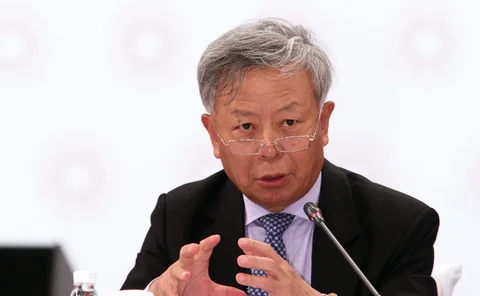Opinion
The IFF China Report 2016: Introduction
The aim of the IFF China Report 2016 is to offer readers a unique insight into the inner workings of China’s economy by providing perspectives from its top leaders, policy-makers and financial experts
State money and bank money: lifting the fog around QE
Steve Hanke says economists are missing important details by focusing on interest rates, rather than the money supply
Brexit and Hungary’s challenge to European governance
The European Central Bank and Europe's political leaders must meet the challenge as another front opens for European monetary stability
Now banks face bail-in, should we rethink deposit insurance?
David Mayes argues deposit insurance schemes forged during crisis may impose unnecessary costs in more normal times
Trilemma, dilemma, and the PBoC's primer for the 'new normal'
Hui Feng argues the PBoC faces a dilemma not a trilemma – but the effort of balancing the two goals is painful all the same
Central Banking launches ‘responsive’ website
New website aims to offer more user-friendly experience, automatically adjusting to whatever device used – be it computer, tablet or smartphone
Money matters: need for a monetary aggregate revival?
Evidence from the years of the Great Recession justify renewed attention to a broadly defined concept of the quantity of money in central bank research
Is China really the cause of sluggish global growth?
China's policy-makers blame structural problem in the West for global malaise, despite unprecedented monetary stimulus by central banks
CCPs: too interconnected to fail?
The likely responses by national authorities to the possible failure of CCPs in stressed conditions aren't generally assured. But they may be reluctant to allow them to fail, writes Richard Heckinger
Challenging crosscurrents from divergent monetary policy
Divergent monetary policies around the world and challenges linked to China’s economic rebalancing present central bankers with some opportunities as well as numerous threats
Questions of credibility in the Eurozone and China
The ECB's credibility was once more called into question over the handling of Greek debt negotiations; positive signs from China amid equity market chaos
Radical rethink of central banking is still possible
Bank of Canada governor Stephen Poloz's call for central banking to be "reinvented" is a timely reminder that others need to heed
Coats: Greece’s banking sector options
Warren Coats assesses the soundness of Greece’s banks and the future challenges for the banking system as a debt crisis looms; proposes an innovative solution to budget deficit
AIIB chief on China's outbound investment development and challenges
Jin Liqun, secretary-general, Multilateral Interim Secretariat for Establishing the AIIB, looks at the challenges and responsibilities of China becoming a major overseas investor
Four steps to creating a multi-layered capital market
Former chairman of China’s National Social Security Fund, Dai Xianglong, describes four steps needed to develop a multi-layered capital market, which includes addressing important data issues
Five problems with floating rate exchange regimes
Robert Aliber bemoans the dangers of sharp moves in major currencies that are the result of floating rate currency regimes, and answers five rhetorical questions related to monetary stability
Shadow banking risks ebbing in China
China has the world’s third-largest shadow-banking sector, but the risks it poses to the overall financial system are overstated, especially following moves by the State Council
The MPC process in light of the Warsh Review
The Bank of England’s revised MPC meeting schedule has some merits but will not add to transparency and raises the risk of news shocks, writes former member Charles Goodhart
In qualified support of coco bonds
Europe’s supervisors need to develop a code of best practice to support the prudential issuance of contingent convertible bonds, argues Andreas Dombret
Central banks are on the losing side of government pacts
Quantitative easing by the ECB and the Bank of Japan brought market cheer. But, absent meaningful structural reform, is miring central banks deeper into an ever-more dangerous policy cycle.
Evaluating the IMF’s performance in the financial crisis
The results of the IMF’s Independent Evaluation Office investigation into the Fund’s handling of the global financial crisis are deeply flawed.
Three strikes against the Federal Reserve
If you want to know why US economic recovery has been so sluggish, look no further than the policies of the Federal Reserve, argues Allan Meltzer
Robert Pringle's Viewpoint: The global finance system is in bad need of repair
Muddling through is not enough: neglect of global money can trigger political earthquakes that sweep away any chance of reasonable debate and compromise
The shift to a multi-polar world
Extraterritorial reach of US policies could hasten the use of alternative currencies; decision on renminbi inclusion in SDR may be a tipping point for relevance of Bretton Woods institutions























